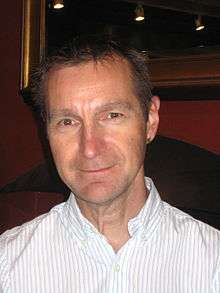Alexander Repenning
Alexander Repenning | |
|---|---|
 | |
| Born | |
| Citizenship | United States, Switzerland |
| Alma mater | University of Colorado at Boulder |
| Known for | AgentSheets |
| Scientific career | |
| Fields | Computer Science, Cognitive Science |
| Institutions | University of Colorado at Boulder |
Work
Dr. Alexander Repenning[1] is the Director of the Scalable Game Design project,[2] a computer science professor, a founder of AgentSheets Inc., and a member of the Center for Lifelong Learning and Design [3] at the University of Colorado in Boulder. Repenning is the inventor of drag and drop blocks programming. His research interests include computer science education, end-user programmable agents, human-computer interaction, and artificial intelligence. Repenning teaches educational game design in the USA, Asia and Europe. He has worked in research and development at Asea Brown Boveri Research, Xerox PARC, Apple Computer, and Hewlett Packard.
Contributions
Repenning is the creator of the AgentSheets and AgentCubes[4] Cyberlearning tools used for game design and computational science applications. As the Director of the Scalable Game Design project, using AgentSheets, he leads an effort to reinvent computer science education in public schools through game design starting at the middle school level. With over 10,000 students, and with funding from the National Science Foundation (ITEST and CE21 programs) and Google, the Scalable Game Design project is conducting the largest US study [5] of computer science education at the middle school level including inner city schools, remote rural areas, and Native American communities. Results indicate that students, across genders and ethnicities, are not only highly motivated to learn computer science through game design but they also learn essential computational thinking skills.[6] They acquire skills through game design, which later they can leverage in STEM simulation creation. Repenning's theoretical contributions include a pedagogical framework called the Zones of Proximal Flow [7] combining Vygotsky’s Zone of Proximal Development with Csikszentmihalyi’s state of Flow.
Recognition
The AgentSheets work has received numerous awards including the Gold Medal from the mayor of Paris for “most innovative application in education of the World Wide Web” at WWW5, and an invitation by the Association for Computing Machinery to showcase AgentSheets as one of the “best of the best innovators” at the ACM1 Conference. Repenning has been a Telluride Tech Festival honoree for contributions to computer science education. Previous honorees include Vint Cerf, recognized as one of the fathers of the Internet, and Alan Kay, recognized as one of the pioneers of object-oriented programming. Repenning has served as advisor to the National Academy of Sciences, the European Commission, The Japanese Ministry of Education, the Organization for Economic Co-operation and Development (OECD), the White House Office of Science and Technology Policy (OSTP) and the National Science Foundation. He is a reviewer for research funding organizations in the USA, Canada, Europe and Asia. He has chaired conferences on end-user programming for kids and has been invited to give talks, guest lectures, workshops, and keynote addresses nationally including at Stanford, the MIT Media Lab, and University of Colorado and at numerous international conferences. Beyond academic recognition, Repenning's work has also been featured in TV News, radio, newspapers and in popular press including WIRED Magazine.[8] In Switzerland, Repenning was selected to be one of the 100 Digital Shapers.[9]
References
- University of Colorado homepage http://www.cs.colorado.edu/~ralex/
- Scalable Game Design project http://scalablegamedesign.cs.colorado.edu Archived 2018-03-10 at the Wayback Machine
- Center for Lifelong Learning and Design http://l3d.cs.colorado.edu
- Repenning, A., Smith, C., Owen B., Repenning, N., Agentcubes: Enabling 3D Creativity by Addressing Cognitive and Affective Programming Challenges, World Conference on Educational Media and Technology, EdMedia 2012, June 26–29, 20122, Denver, Colorado, USA. http://sgd.cs.colorado.edu/wiki/images/4/49/AgentCubesEdMediaCS_hard_and_boring_2012.pdf
- Scalable Game Design Study summary http://sgd.cs.colorado.edu/wiki/images/c/c7/One_Pager_CE21_CT4TC.pdf
- Webb, D., Repenning, A. and Koh, K. Toward an Emergent Theory of Broadening Participation in Computer Science Education. In Proceedings of the ACM Special Interest Group on Computer Science Education Conference, (SIGCSE 2012) (Raleigh, North Carolina, USA., February 29 - March 3, 2012). ACM, 173-178. http://sgd.cs.colorado.edu/wiki/images/f/fd/SIGSCE2012_Final_Submit.pdf
- Basawapatna, A., Repenning, A., Koh, K. H., and Nickerson, H., The Zones of Proximal Flow: Guiding Students Through A Space Of Computational Thinking Skills and Challenges. In Proceedings of the International Computing Education Research (ICER 2013) (San Diego, CA, USA., August 12–14, 2013). ACM Press. http://sgd.cs.colorado.edu/wiki/images/4/4c/ICER-2013_zones_of_proximal_flow.pdf
- Brendan, I., Koerner, Forget Foreign Languages and Music. Teach Our Kids to Code, WIRED Magazine, October 2013 https://www.wired.com/opinion/2013/09/ap_code
- Diese Köpfe machen die Schweiz fit für die Zukunft, Bilanz, October 2016 http://www.bilanz.ch/bildergalerie/diese-koepfe-machen-die-schweiz-fit-fuer-die-zukunft